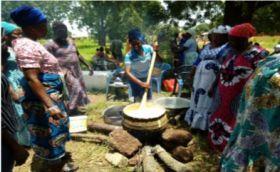
Agriculture-education charity Marshal Papworth Fund has partnered with Harper Adams University from this year's intake of students.
Marshal Papworth helps growers and farmers in developing countries to learn new skills that they take back to their home communities and share with others. The project will welcome its 79th short course student as part of its intake of 10 this year, as it looks to extend the opportunity for communities to grow themselves out of hunger with a practical course in sustainable modern agriculture.
Ed Mashatise, lecturer in sub-Saharan and tropical agriculture at Harper Adams University, said: “This new partnership with the Marshal Papworth Fund is especially valued by Harper Adams, not only because the programme is so beneficial to the studentsbut also because it fits in perfectly with the university’s international strategy collaborating in Africa, which so far has included training graduates in Africa in agri-business, agronomy and mechanisation skills.
'We are thrilled to welcome this year’s 10 students to Harper Adams and joining the Marshal Papworth vision to bring modern sustainable agriculture to the developing world.”
Marshal Papworth Fund coordinator, Sandra Lauridsen, added: “We know that the impact our students create when they return home is huge, with one of our alumni having set up a food security project supporting 10,000 poor rural households in Ghana following his studies in the UK. So with every intake of students the committee and all of its supporters and partners are immensely excited about reaching even more rural communities.
“We are especially excited that the short course has moved to one of the country’s leading agricultural universities, Harper Adams, where our students will undertake a specially devised sustainable farming programme, including workshops in livestock farming, ‘train the trainer’ skills, woodland management, business skills, soil and water conservation, basic machinery handling and maintenance skills, crop husbandry, sustainable land and habitat management, as well as farm and cultural visits.”



